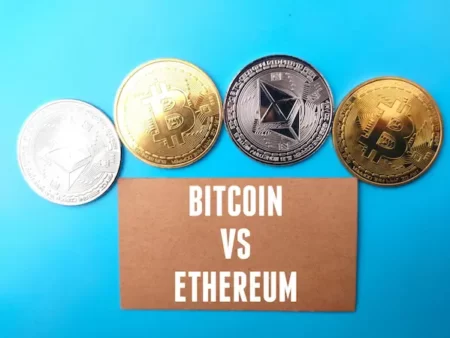In the recent years, the world has seen a significant rise in the popularity of cryptocurrencies. Among the most well-known and widely used digital currencies is Bitcoin. Bitcoin is a decentralized currency developed in 2009 by an anonymous person using the name Satoshi Nakamoto. Bitcoin transactions are processed through a peer-to-peer network, with each node verifying and recording the transaction on a blockchain public ledger.
Unlike traditional currencies, Bitcoin has no physical form and is entirely digital. It operates without the involvement of banks or other financial institutions, and the value of Bitcoin is defined by supply and need in the market. Despite its decentralized structure, Bitcoin has become a significant player in the global economy, with its value reaching record highs in recent years.
In this blog post, we’ll delve into the world of Bitcoin coin. We’ll explore the basics of what Bitcoin is, how it works, and why it has evolved such a popular form of currency.
Bitcoin is a digital currency that operates independently of a central bank.
Bitcoin coin is a decentralized digital currency that operates independently of a central bank. It was introduced in 2009 by an unknown person or group by name “Satoshi Nakamoto.” Bitcoin allows for direct, peer-to-peer transfers of value without intermediaries like banks or payment processors. Transactions on the Bitcoin network are verified by a network of computers called nodes, using a complex algorithm known as the blockchain. This system allows for transparency and security, as the transaction is documented on a public ledger that cannot be tampered with. The value of Bitcoin is not backed by any physical asset but rather by the agreement of its users that it has value. Its supply is capped at 21 million coins, mined through a process requiring significant computational power. Bitcoin has seen significant fluctuations in value over the years, but it remains a popular investment and payment option for those seeking an alternative to traditional monetary systems.
It was created in 2009 by an unknown person or group by name Satoshi Nakamoto.
The true identity of Satoshi Nakamoto remains a mystery to this day. The initial release of the Bitcoin software was intended to create a decentralized digital currency that would eliminate the need for traditional banks and government oversight. The whitepaper published by Nakamoto detailing Bitcoin’s design and functionality has now become a widely-cited document in the cryptocurrency space. The release of Bitcoin coin offered a new payment method with no middlemen, low transaction fees, and the ability to make secure transactions anonymously. It contains since expanded to evolve one of the most widely recognized cryptocurrencies in the world.
Bitcoin transactions are recorded on a public ledger called the blockchain.
Bitcoin is a cryptocurrency that any central authority or institution does not control. As such, it uses a decentralized system known as the blockchain to record transactions made with Bitcoin coin. The blockchain is a digital ledger that documents all Bitcoin transactions, adding them to a chain of information that forms an unalterable and transparent record of every transaction. This ensures that Bitcoin transactions are secure, verifiable, and virtually tamper-proof. The beauty of this method is that it’s completely decentralized, meaning that no single individual or entity controls it. Instead, the blockchain is maintained collectively by a network of millions of computers across the world. This guarantees trust and transparency for all participants in the Bitcoin network, from individual users to institutional investors.
To acquire Bitcoin, you can buy or mine it on a cryptocurrency exchange.
To acquire Bitcoin coin, there are two main ways to obtain it: buying it on a cryptocurrency exchange or mining it. Cryptocurrency exchanges allow you to purchase Bitcoin coins with traditional fiat currency or other digital assets. Many exchanges are available, but it’s important to research and select a reputable one that offers secure storage of your coins. On the other hand, mining involves using specialized computer hardware to solve complex mathematical algorithms and earning a Bitcoin coin as a reward. However, this method can be expensive and requires significant technical knowledge and resources. Ultimately, the method you choose to obtain Bitcoin coins will depend on your circumstances and preferences.
The supply of Bitcoin is limited, with a max of 21 million coins that can ever exist.
One of the key features of the Bitcoin coin is its limited supply. Unlike traditional currencies that can be printed and circulated almost indefinitely, the maximum number of Bitcoin coins that will ever exist is capped at 21 million. This limit was put in place by the cryptocurrency’s mysterious founder, Satoshi Nakamoto, in order to create scarcity and prevent inflation. As of now, over 18.7 million Bitcoin coins have been mined, leaving only around 2.3 million yet to be discovered. The supply of Bitcoin coins is also controlled through a process known as halving, which reduces the block reward given to miners every four years or so. This means that the rate of new Bitcoin coin creation slows down over time, thus ensuring that the maximum supply will only be reached by the year 2140.
The value of Bitcoin can be highly volatile and subject to speculation.
Bitcoin coin is a decentralized digital currency that operates independently of a central authority. Its decentralized nature is one of its core strengths, as it lets users transact directly with each other without the requirement for intermediaries like banks. Nevertheless, one of the potential downsides of Bitcoin coin is its highly volatile nature. The value of a Bitcoin coin can fluctuate rapidly and unpredictably, and this volatility is often subject to speculation. This means that people may buy or sell Bitcoin coin based on predictions about their value rather than on their actual utility as a currency. As a result, the price of a Bitcoin coin can be influenced by market sentiment and other external factors, which can make it difficult to predict or control its value. It’s important for people interested in using or investing in Bitcoin coin to understand these risks and to approach the currency with caution.
Bitcoin can be stored in a digital wallet, which can be accessed through a private key.
One of the unique features of a Bitcoin coin is that it can be stored in a digital wallet, which can be accessed through a private key. This process allows holders of Bitcoin coin to securely store their cryptocurrency without relying on a centralized entity like a bank. One advantage of storing Bitcoin coins in a digital wallet is that they can be easily accessed and sent to other users worldwide, enabling quick and efficient transactions. However, it is important to protect your private key and ensure that your wallet is secure, as losing access to your key can result in losing access to your Bitcoin coin. Overall, storing Bitcoin coin in a digital wallet with a private key gives users considerable flexibility and control over their cryptocurrency investments.
Bitcoin has gained increasing mainstream acceptance over the years, with major companies like PayPal now supporting the cryptocurrency.
Bitcoin coin has gained widespread acceptance over the years, with numerous major companies now supporting the cryptocurrency. One such company is PayPal, which announced in late 2020 that it would enable its users to buy, hold, and sell Bitcoin coin and other cryptocurrencies directly through their accounts. This marked a significant milestone in the Bitcoin coin’s evolution, as PayPal is one of the largest payment platforms in the world, with over 361 million active accounts. Other notable companies that now accept Bitcoin coin include Microsoft, Expedia, Overstock.com, and Shopify. Moreover, several countries, including Japan, Australia, and Canada, have also made strides in adopting Bitcoin coin as a legitimate form of currency.
In conclusion, Bitcoin has taken the world by storm, capturing investors’ attention and everyday people interested in the concept of digital currency. While it has faced its fair share of scrutiny and skepticism, Bitcoin’s value continues to rise, proving that it is here to stay. As more individuals and institutions adopt Bitcoin and other cryptocurrencies, it will be fascinating to watch how this emerging market evolves and changes the world of finance as we know it.












